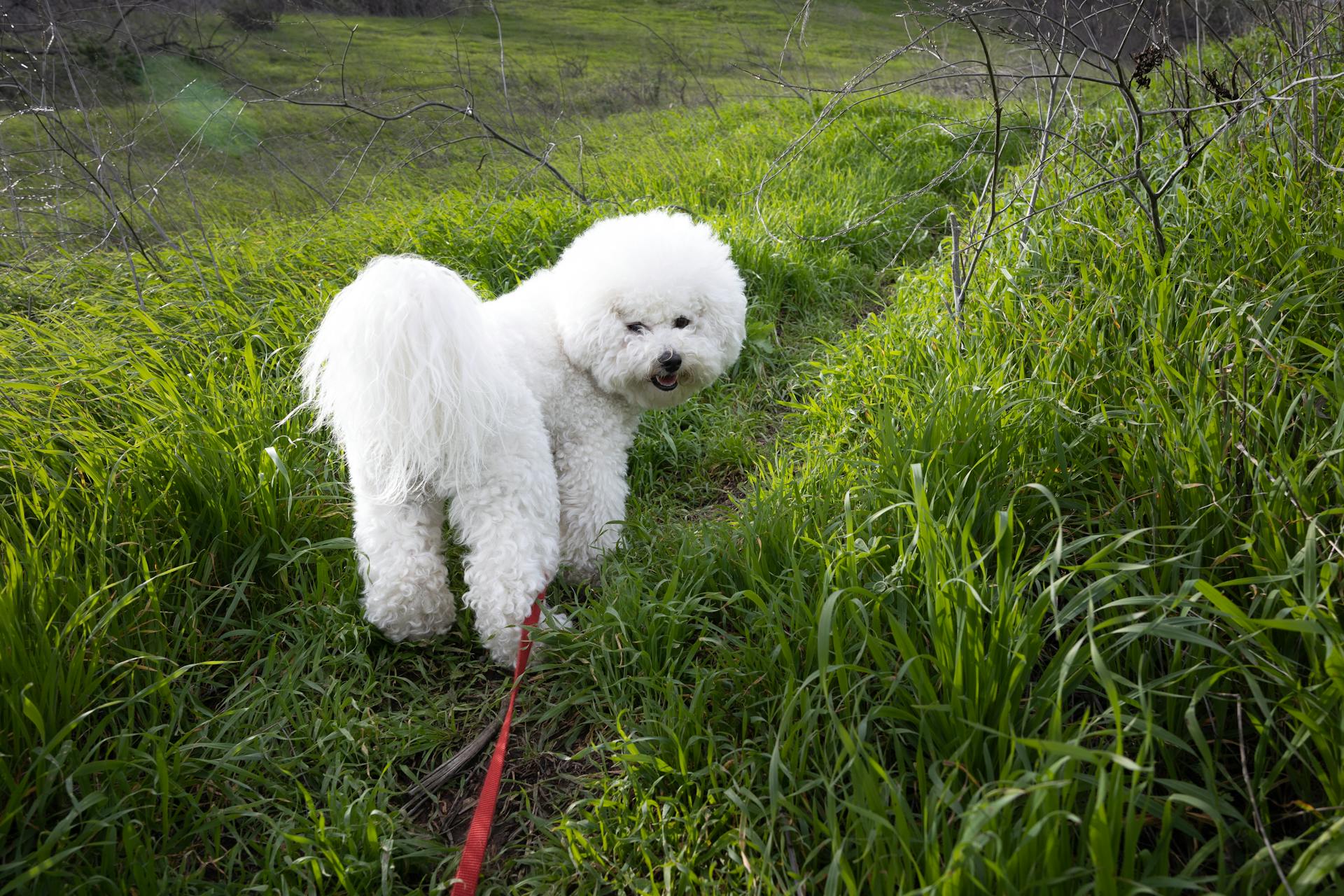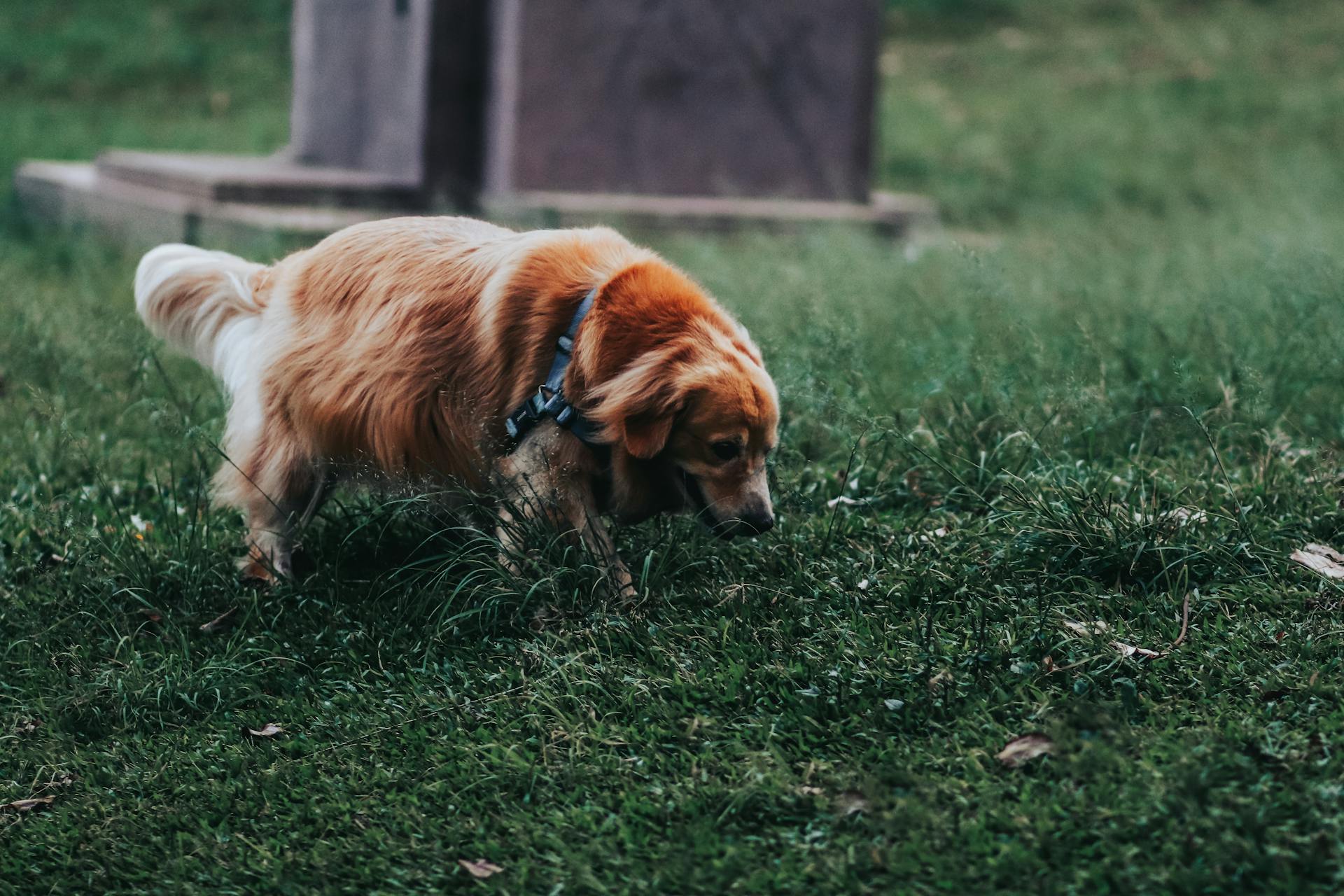
Bichon Frises are playful dogs that require regular exercise to stay happy and healthy. They need daily walks and playtime to prevent boredom and destructive behavior.
Bichon Frises are intelligent dogs that can be trained with positive reinforcement techniques. They thrive on attention and praise, making them a great choice for families.
A Bichon Frise's coat requires regular grooming to prevent matting and tangling. They need to be brushed daily and bathed every 2-3 weeks.
Bichon Frises are social dogs that require regular interaction with their owners and other pets. They can become anxious and destructive if left alone for too long.
For your interest: Dogs from Puppy Mills Behavior
Understanding Temperament
Bichon Frises are known for their affectionate and playful nature, making them a popular breed among dog owners.
Their temperament is characterized by being cheerful, amiable, and energetic, with a strong desire to be around people and other pets. They're often described as "vivacious" and "charming" companions.
Bichon Frises are social butterflies, fitting into family life like a dream and creating unbreakable bonds with their pet parents. They thrive on attention and affection, making them great family dogs.
However, this social nature can also make them prone to separation anxiety and stress when left alone for long periods. They need regular human interaction and mental stimulation to prevent boredom and anxiety.
Here are some key temperament traits to keep in mind:
- High energy and playful
- Adaptable to most households, including those with children and cats
- Love being around people and other pets
- Prone to separation anxiety and stress when left alone
- Need regular human interaction and mental stimulation
Bichon Frises are natural people pleasers with high intelligence and a willingness to learn, making them easy to train and eager to please. However, they can be quite vocal, so training and early socialization is key.
Training Your
Training your Bichon Frise requires patience and consistency. They are intelligent dogs that are eager to please their owners, making them easy to train.
Bichon Frises tend to pick up training easily and respond well to positive reinforcement methods. This self-assured breed may become overbearing if not trained well from an early age.
Start puppy training from around three months old to reduce the likelihood of common Bichon Frise problems, including excessive barking and slow housetraining.
The Bichon Frise is highly trainable, and they can learn a variety of tricks. Potty training and simple cues such as “sit” and “stay” are typically mastered quickly due to their intelligence.
Positive reinforcement techniques are the most effective way to train your Bichon Frise. Reward your dog for good behavior with treats, praise, and affection.
Here are some key training tips to keep in mind:
- Start training from an early age to prevent common problems
- Use positive reinforcement techniques, such as treats and praise
- Be patient and consistent in your training
Separation Anxiety and Stress
Bichon Frises are prone to separation anxiety, a behavioral issue that can cause distress and destructive behavior when left alone. This can lead to negative behaviors such as excessive barking, chewing, howling, crying, vomiting, urinating, defecating, scratching walls, breaking things, and even biting furniture.
To prevent separation anxiety, it's essential to gradually acclimate your Bichon Frise to being alone. Start by leaving them alone for short periods and gradually increase the duration. Providing them with plenty of toys and treats can also help keep them occupied while you are away.
Some common signs of anxiety in dogs include pacing, panting, drooling, trembling, and hiding. These symptoms can also be caused by other factors, such as illness or boredom, so it's crucial to rule out any underlying medical issues before assuming separation anxiety.
Recognizing these symptoms early on can help you take proactive steps to manage your Bichon Frise's stress levels. By doing so, you can create a happier and healthier environment for your furry friend.
See what others are reading: Bichon Frise Separation Anxiety
Puppy Development and Care
Puppies require a lot of attention and care, especially during their early development stages. Leaving a puppy alone for extended periods can be detrimental to their mental and physical health.
Puppies need social interaction and playtime to develop their cognitive and social skills. They will thrive in environments where they receive plenty of love and attention from their family.
Bichon Frises, being social dogs, love to play and be around their family. They're content to lounge with their family on the couch, especially during their downtime.
Related reading: Shih Tzu Bichon Puppies
Puppies, including Bichon Frises, need training to behave well and not develop destructive habits. Bichons are easily trainable because they're so eager to please their humans.
Leaving a Bichon Frise alone for more than a few hours can lead to anxiety, depression, and destructive behavior. It's essential to consider their age and needs when deciding how long they can be left alone.
A unique perspective: Can Bichon Frise Be Left Alone
Environmental Enrichment
Bichon Frises are social dogs that require a lot of human interaction. If left alone for extended periods, they may become anxious, bored, and destructive.
To prevent this, it's essential to provide environmental enrichment to keep them entertained and mentally stimulated. This can be achieved by leaving the TV or radio on to provide background noise and making them feel less alone.
Leaving a window view can give them something to watch and keep them entertained. Providing interactive toys, such as puzzle games and treat-dispensing toys, can keep them occupied for hours.
Chew toys can help satisfy their natural urge to chew and prevent them from destroying furniture or other household items. Spending time with them before leaving and after returning can help reduce their anxiety and make them feel loved.
Pet Care and Health
Bichon Frises are social dogs that thrive on interaction with their family. They love to play and be around people.
Their small stature makes them a great fit for apartment living, where they can easily adapt to a cozy space.
Bichon Frises are prone to barking when they sense foreign sounds, but they're also eager to please and respond well to training.
How Much to Feed
Feeding your pet the right amount is crucial for their overall health and well-being. Closely follow the dog food manufacturer's feeding recommendations to ensure you're giving your pet the proper portions.
If your pet's weight becomes abnormal or concerning, discuss their nutritional needs with your veterinarian. They can provide personalized advice based on your pet's unique needs.
To determine the right amount to feed your pet, consider their age, size, and activity level. For example, a Bichon Frise's nutritional needs may vary depending on their age and weight.
Pet Care
Bichon Frises are social dogs that thrive on interaction with their family, and they love to play with their favorite toys.
They're relatively low-maintenance when it comes to exercise, as they can get most of their energy out with some living room playtime.
Bichons are easily trainable because they're eager to please their humans, and they can even learn specialty tricks like dancing.
However, they do require daily brushing and monthly baths to prevent their hair from matting.
Their small stature makes them a great fit for apartment living, and they tend to bark only when alerted to foreign sounds.
But despite their small size, they're not excessive barkers, and strangers quickly become friends of the Bichon Frise.
A different take: Small Breed Bichon Frise
Ear Care
As a Bichon Frise owner, it's essential to prioritize ear care to prevent infections. A Bichon Frise should have her ears cleaned once a month.
You can do this yourself at home using an over-the-counter ear cleanser, or take your pup to the groomer for a professional cleaning.
Excessive ear hair can predispose Bichons to ear infections, so keep an eye out for excessive scratching at the ears. If you notice your Bichon's ears are smelly or painful, it's time to take them to the vet for an examination.
Intriguing read: Bichon Frise Ears
Frequently Asked Questions
What are the pros and cons of a Bichon Frise?
Bichon Frises are ideal for apartment living due to their low exercise needs and minimal barking, but they require regular grooming. They make great companions for city dwellers, but may not be the best choice for those seeking a guard dog.
Do bichons bond to one person?
Yes, Bichon Frises are known to form a strong bond with one person in the family, often becoming their loyal companion. This unique attachment makes them a great fit for families who want a devoted furry friend.
Do Bichon bark a lot?
Bichon Frises are not excessively vocal, but they may bark to get attention or alert their owners. They can develop barking habits if left alone for extended periods.
Do bichons like to be cuddled?
Yes, Bichon Frises are extremely affectionate and love to cuddle, making them perfect companions for those who enjoy snuggles. They thrive on human interaction and attention, so be prepared for plenty of cuddle time!
What is special about Bichon Frise?
Bichon Frises are friendly, adaptable dogs that make great companions for families and city living due to their outgoing and confident nature. They are naturally curious and affectionate, making them ideal pets for those seeking a loving and social furry friend.
Featured Images: pexels.com


